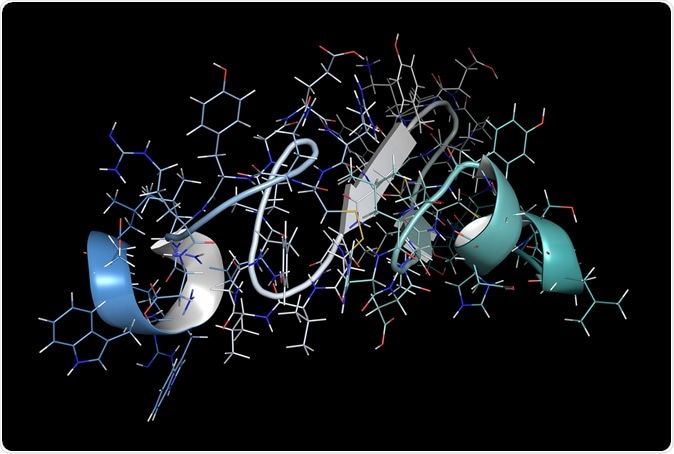Researchers in Frankfurt, Germany, have described cell signaling events that occur when severe acute respiratory syndrome coronavirus 2 (SARS-CoV-2) infects host cells and have identified pathways that are essential for the virus to replicate.
The team found that the growth factor receptor (GFR) signaling pathway and pathways downstream of it were activated on infection and that targeting them with approved cancer drugs stopped SARS-CoV-2 replication.
The researchers say the study provides new insights into the molecular mechanisms underlying SARS-CoV-2 infection and offers potential new strategies for treating coronavirus disease 2019 (COVID-19).
The findings can be accessed in a pre-print version of the paper, available in medRxiv*, while the article undergoes peer review.
Repurposing existing drugs would be one way to help combat the COVID-19 crisis
As the novel coronavirus SARS-CoV-2 continues to spread and infect people around the world, researchers are busy trying to combat the global health crisis. Great efforts are being made by scientists globally to develop drugs that can dampen the disease course of COVID-19 and relieve the strain on healthcare services.
The repurposing of certain drugs that are already available would be an ideal way to provide treatments rapidly and this has been the focus of many studies over recent months. However, most of the research has so far been computational and has not involved tests in models of infection.
Furthermore, drug development studies are hindered by a lack of understanding about the molecular mechanisms and host cell signaling that underlie SARS-CoV-2 infection and replication.
“To rationally repurpose drugs, a molecular understanding of the infection and the changes within the host cell pathways is essential,” write the researchers. “Experimentally identifying viral targets in the cell allows candidate drugs to be selected with high confidence for further testing in the clinics to reduce the risks for patients resulting from tests with drugs lacking in vitro validation.”
An in vitro model of infection for investigating cell signaling events
Now, Kevin Klann (Faculty of Medicine, Goethe University) and colleagues have used an in vitro cell culture model of SARS-CoV-2 infection that they recently developed to investigate cell signaling events by phospho-proteomics. The model used a highly permissive colon epithelial cell line called Caco-2, which has previously been used to study coronaviruses.
The analysis revealed changes in phosphoprotein networks that occurred once cells were infected with SARS-CoV-2.
Specifically, they pinpointed phosphorylation sites on multiple viral proteins once the virus had infected cells, demonstrating that the proteins undergo efficient modification once inside host cells.
“Until now, we can only speculate about the host kinases involved and the functions driven by PTMs [post translational modifications], which will be an important topic for follow-up studies,” says the team.
They also identified phosphorylation-driven changes in host cell signaling. Certain pathways had been extensively rearranged, especially GFR signaling pathway.
Crucial GFR signaling pathways had been activated, including epidermal growth factor receptor (EGFR) and platelet-derived growth factor receptor (PDGFR) signaling, as well as an abundance of associated signaling molecules.

Epidermal growth factor (EGF) signaling protein molecule. 3D rendering. Image Credit: StudioMolekuul / Shutterstock

 This news article was a review of a preliminary scientific report that had not undergone peer-review at the time of publication. Since its initial publication, the scientific report has now been peer reviewed and accepted for publication in a Scientific Journal. Links to the preliminary and peer-reviewed reports are available in the Sources section at the bottom of this article. View Sources
This news article was a review of a preliminary scientific report that had not undergone peer-review at the time of publication. Since its initial publication, the scientific report has now been peer reviewed and accepted for publication in a Scientific Journal. Links to the preliminary and peer-reviewed reports are available in the Sources section at the bottom of this article. View Sources
GFR signaling had already been implicated in cancer pathogenesis and some viral infections
The researchers say GFR signaling plays vital roles in the pathogenesis of cancer, and research has also shown it to be essential for some viral infections.
“GFR activation leads to the modulation of a wide range of cellular processes, including proliferation, adhesion, or differentiation,” Klann and colleagues.
They say that over recent years, research has shown that several viruses, including Epstein-Barr virus, influenza, and hepatitis C, use EGFR to enter cells.
“It has been shown for many viruses that modulation of host cell signaling is crucial for viral replication and might exhibit strong therapeutic potential,” writes the team.
Prominent cancer drugs stopped viral replication
Suspecting that GFR signaling may also be essential to SARS-CoV-2 infection, the researchers decided to inhibit this pathway using five well-known cancer drugs.
Interestingly, all five compounds stopped the replication of SARS-CoV-2, at clinically achievable concentrations.
“Due to their clinical availability, these drugs could be rapidly transitioned towards clinical trials to test their feasibility as a COVID-19 treatment option,” suggests the team.
Klann and colleagues say that, together, the findings offer new insights into the molecular mechanisms triggered by SARS-CoV-2 infection and suggest that inhibition of GFR signaling pathways may be of benefit to patients with COVID-19.
“Proteomic analyses revealed several pathways that are rearranged during infection and showed that targeting of those pathways is a valid strategy to inhibit cytopathic effects triggered by infection,” concludes the team.

 This news article was a review of a preliminary scientific report that had not undergone peer-review at the time of publication. Since its initial publication, the scientific report has now been peer reviewed and accepted for publication in a Scientific Journal. Links to the preliminary and peer-reviewed reports are available in the Sources section at the bottom of this article. View Sources
This news article was a review of a preliminary scientific report that had not undergone peer-review at the time of publication. Since its initial publication, the scientific report has now been peer reviewed and accepted for publication in a Scientific Journal. Links to the preliminary and peer-reviewed reports are available in the Sources section at the bottom of this article. View Sources